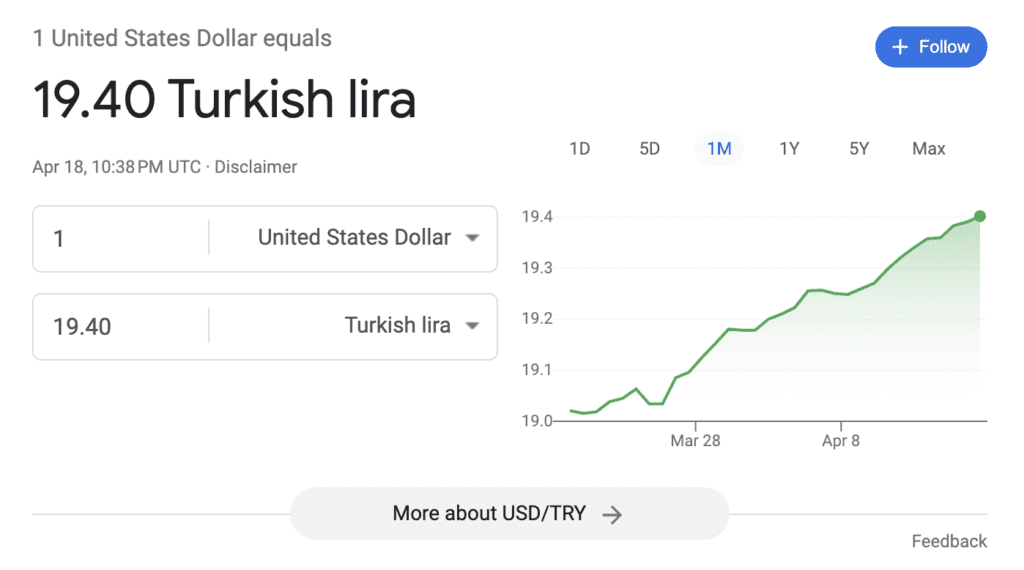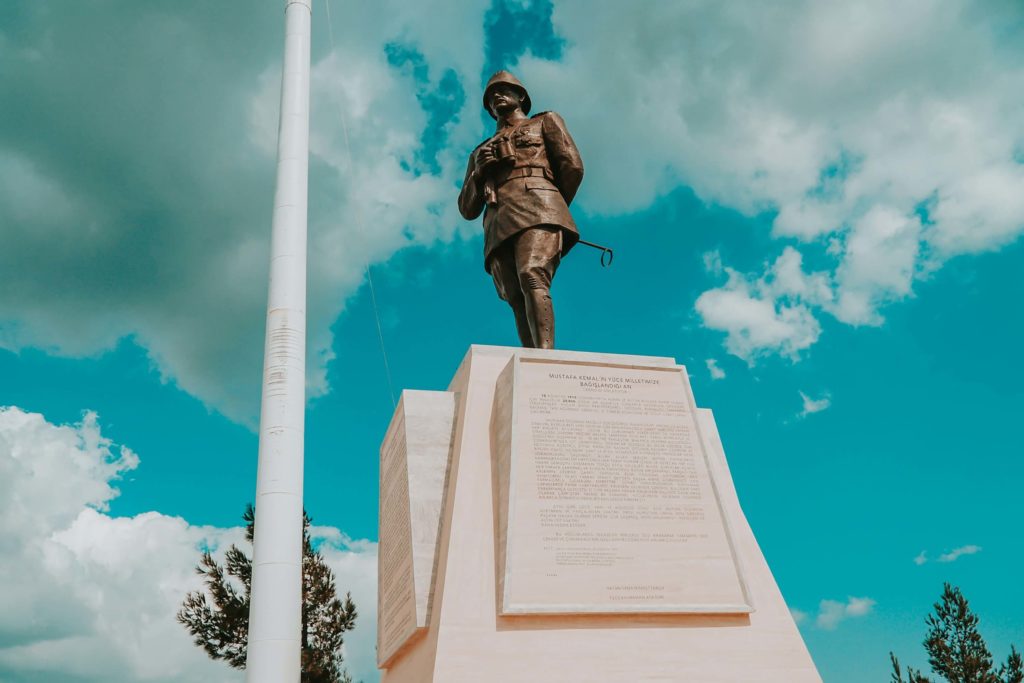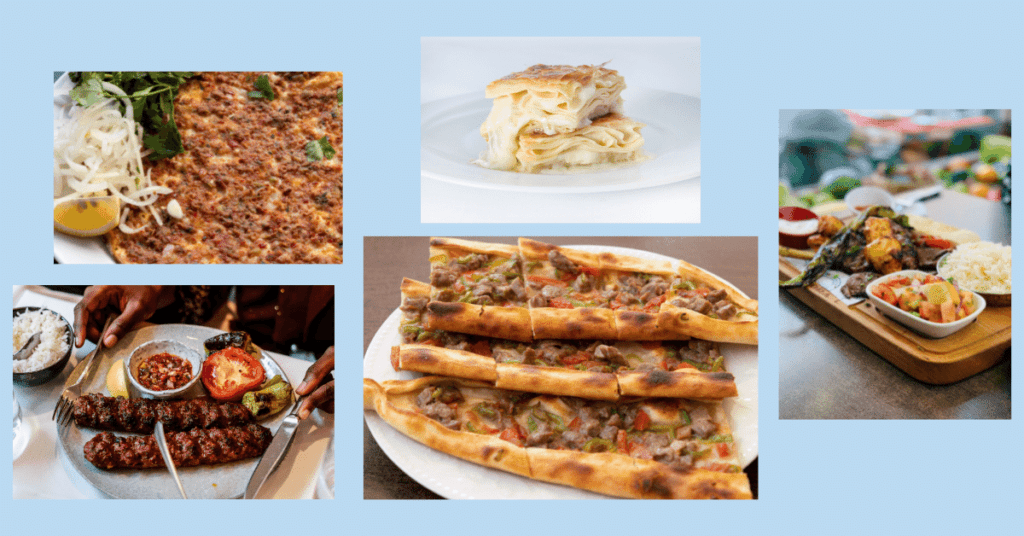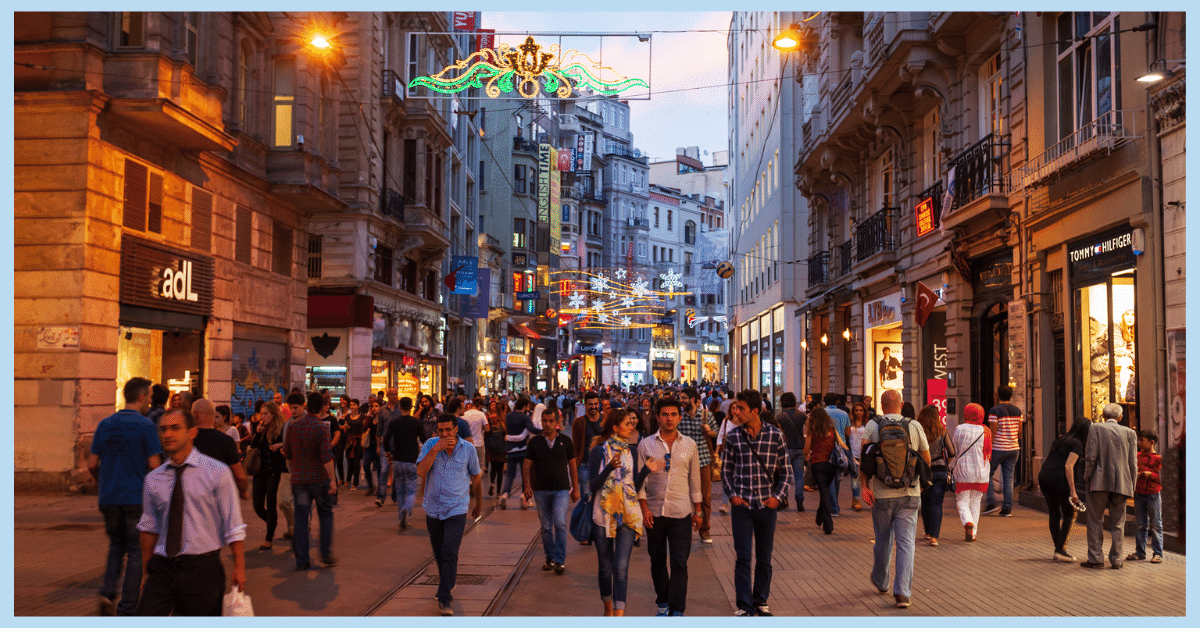Growing up Turkish-American, I had one foot in Turkey and one foot in America. These are 20 interesting, lesser known facts about Turkish culture that I’ve personally witnessed and experienced over the years.
1. Cleanliness is a must-have
When Romans and Byzantines extended their range and mingled with Turkish people in the 7th century, it set off a squeaky clean chain of events. Hammams (Turkish bathhouses) became so popular that people used to go not only to clean their bodies and “souls”, but to also socialize and relax.
While bathhouses in Turkey aren’t as popular as they once were, the cultural focus on cleanliness never disappeared. In fact, it’s actually gotten a lot more ingrained in Turkish culture. It’s generally expected for guests to take off their shoes when they visit a friend’s home, soap comes in a million different scents and looks, and you’ll rarely see a sink full of dirty dishes.
Let’s just say this: it’s relatively rare to see a super grimy or messy home in Istanbul (where about 18% of the Turkish population lives).
2. They’re generous hosts every time you visit
Turkish hosts won’t ever NOT offer some kind of drink or tasty snack to their guests. Sometimes they’ll even offer both! While not every host will offer a snack, 99% will offer water, Turkish tea, and/or Turkish coffee.
And it can be considered rude if guests don’t accept anything, so even if you didn’t want anything to drink or eat, it’s still polite and friendly to just accept a glass of water.
3. About 31% of the Turkish population smokes cigarettes
In comparison, about 12.5% of Americans smoke cigarettes. That’s 2.5 times LESS than smokers in Turkey! If you couldn’t tell already, cigarettes are extremely common among Turkish adults, and unfortunately even Turkish youth. Roughly 5.3% of teenagers between the ages of 13 and 15 smoke in Turkey.
Littering cigarette butts is (also unfortunately) very common, so don’t be surprised to see a bunch of them on the streets, especially when there’s no garbage bin nearby.
And smoking cigarettes is allowed in outdoor spaces, including outdoor seating in cafés and restaurants, so be conscious of where you sit if you’re not a fan of secondhand smoke.
4. Turkish people generally love meeting in cafés or others’ homes for long, friendly chats
Turkish people are typically VERY social! They can chat for hours about anything and everything, especially over a cup of Turkish tea or coffee.
Over the past few years, cafés in Istanbul have exploded in popularity and tend to attract young people. Before the time of cafés though, people would become good friends with their neighbors and they’d frequently visit each other’s homes to socialize.
I saw this firsthand growing up when my grandma and grandpa (on my dad’s side) were best friends with their next door neighbors (my grandpa has since passed, but my grandma is still best friends with that neighbor!). They’ve been close friends ever since my grandparents first moved into their apartment way back in the 60s, so they’ve been in each other’s lives for over 60 years now! That was the power of community and neighborly friendship in Turkey in the past.
5. Turkish tea is life
If we had to break it down, Turkish people are probably made up of 60% Turkish tea instead of 60% water like everyone else.
Everyone drinks so much that at a lot of cafés and restaurants, it’s either super cheap or free! People can easily drink 3+ cups of Turkish tea, and it’s especially popular after a meal. My Turkish mom can down 5 cups no problem after having dinner. Steaming hot? She can still drink it. I couldn’t finish my 3rd cup? She’ll likely happily finish it for me.
In fact, my entire Turkish family are big Turkish tea drinkers! It’s served both casually and for special occasions like birthdays, weddings, anniversaries, etc. And you can easily find it at any café, restaurant, or grocery store.
6. Turkish coffee is also life
So if Turkish people are probably 60% Turkish tea, they’re likely 25% Turkish coffee. People drink it at all times of the day – the caffeine level doesn’t deter them from even drinking it at night like after dinner or with dessert. Whenever I’m in Turkey, I always love a low sugar cup of Turkish coffee after dinner to wrap up a nice meal.
It comes in different levels of sugar, so you can customize the taste of your cup of coffee. And it holds a special place at all kinds of celebrations. Next to Turkish tea, it’s easily the second most consumed drink in Turkey.
7. Sorry, but driving on Turkish streets is the worst (and not because of the road!)
Sometimes the roads in big Turkish cities can be chaotic. Cars driving on the shoulder of the highway, cutting you in line waiting for an exit, motorcycles speeding in between cars because they don’t want to wait for traffic to go, taxis pretending to be police cars to get through traffic, drivers not signaling when they’re about to turn – I could go on.
If you’ll be a tourist in Turkey, I strongly recommend NOT renting a car and instead relying on taxis to get around. As long as you’re not somewhere super rural or remote, there’s always taxis in the area and they’re not that expensive. Be sure to save the number of a good, local Taxi company in your phone for easy access. If you’re in a touristy area, they’ll most likely even know some English.
Also, you might see locals jaywalking but DON’T DO IT! Cars can easily come out of nowhere and a lot of drivers don’t really care about pedestrians. One time, a motorcycle almost hit me when he didn’t stop even though he could see I was crossing the road.
8. The superstition is strong when it comes to The Evil Eye (in Turkish: nazar)
So let’s be clear here: the predominant religion and belief system in Turkey is Islam. But over the centuries, Turkish people in general have developed a kind of superstitious nature.
When it comes to The Evil Eye, the common consensus (especially among the older generation) is that hanging up or wearing the symbol can protect you from evil spirits, energies, or even evil people. That’s why you’ll see a lot of evil eyes hung up around homes, stores, or buildings. And why you’ll see a lot of jewelry stores selling evil eye jewelry.
As I write this, I’m wearing an evil eye necklace – my Turkish mom would be proud.
9. Elders are immensely respected
In Turkish culture, your elders are at the top of the respect totem pole. That means a certain level of respect toward them is always expected and if you ever disrespect them it’s a big deal.
Twice a year, there’s two holidays in Turkey where young people would go around their family and neighbors to kiss their hands and wish them well. This was a sign of high respect. Nowadays for those holidays, young people only visit their closest elders or just give their elders a call if they’re not able to go in-person.
Parents are just one notch below elders, so kids are expected to listen at all times to both their elders and parents.
10. Turkish people prefer to use their network to find trustworthy service providers (dentists, opthamologists, medical doctors, nannies, lawyers, etc.)
Just like anywhere else in the world, it can be hard to find trustworthy service providers. So Turkish people prefer to just bypass that whole search and instead they rely on their network to get recommendations for all kinds of service providers (whatever they’re needing at that time).
For years, my Turkish parents and their Turkish friends have all used their network. My parents have found good doctors, eyeglass shops, woodworkers, painters, etc. just by asking around. Culturally, it’s easier to trust others’ recommendations than it is to search and find help yourself.
In close-knitted networks and friend groups, people don’t recommend anything they don’t like because they don’t want their friends to have a bad experience, so you know you’re getting a legitimately good recommendation.
11. Strangers refer to each other with respect (and what they say differs if they’re speaking to a man or woman)
In Turkish culture, strangers typically refer to each other with respect by adding ‘bey’ (man) for men or ‘hanim’ (woman) for women to the end of each other’s names. For example, after learning each other’s names, Bob would greet Sarah by referring to her as Sarah hanim, whereas she would refer to him as Bob bey.
This just shows respect and politeness towards the other person, and as people get more familiar with each other they’ll drop the formalities and simply refer to each other by name.
And if strangers don’t know each other’s names, they’ll refer to a woman as ‘hanim effendi’ and a man as ‘bey effendi’. For example, if a parking lot security guard needed you to move your car and you’re a woman, he’d say ‘hanim effendi’ please move your car (in Turkish, of course).
12. Negotiating is very normal when shopping at farmer’s markets, bazaars, or fairs
Just to be crystal clear, don’t go and start negotiating in Turkish stores. That pack of crackers or Nike hoodie costs what it costs. But if you go to a farmer’s market, bazaar, fair, or any kind of market with small, independent sellers, you can negotiate prices.
But please be kind and pay a fair value exchange. Small, independent sellers are very hard workers and have families to support. As of April 18th, 2023, 1 U.S. Dollar (USD) is equivalent to 19.40 Turkish Liras (TRY), so things are pretty inflated and salaries/wages haven’t kept up for a lot of people.

13. Mustafa Kemal Atatürk, the founder of the Republic of Turkey, is highly beloved

Growing up Turkish-American, I remember seeing Atatürk’s photo everywhere. An Atatürk calendar my mom’s mom had up on her wall, on a wall at a local bank, on the walls of Turkish friend’s homes – so many places.
Mustafa Kemal Atatürk was a Turkish field marshal, revolutionary statesman, author, and the founding father of the Republic of Turkey, serving as its first president from 1923 until his death in 1938. He’s credited with industrializing and secularizing Turkey.
Interesting fact: the Turkish Parliament granted him the surname Atatürk in 1934, which means “Father of the Turks”, because of his role in building the modern Republic of Turkey we know today.
14. Turkish people are mostly conservative (while younger generations in big cities are generally less conservative)
For centuries (including the Ottoman Empire), Islam has been the religion of this region. So it’s deeply ingrained in society, which means, for example, you’ll see a diverse mix of clothing for both men and women.
Please keep in mind: in more religious areas, it can be dangerous to wear a mini-skirt or to hold hands, especially if you’re a LGBTQ+ couple.
But in certain areas of big cities (where just young people hang out), you’ll find the least conservative people. Istanbul, for example, is really diverse!
15. Before COVID-19, touching both cheeks with someone you’re greeting (like the French do!) was the norm
Yep, Turkish culture has not only picked up some French words, but Turkish people used to (before CV-19) greet each other by touching both cheeks to the other person’s cheeks like the French do. It was a friendly, polite way of greeting someone and friends and family would always greet each other like this.
Even though most people have relaxed their CV-19 precautions, some people still prefer to greet each other safely and not get in each other’s faces. It’s considered polite to ask the other person their preference.
16. Soccer is a big deal and the team you support is an even bigger deal
Soccer is so huge in Turkey that even my Turkish grandma was passionate about the team she supported. One year, she gifted me a necklace with the team’s emblem on it – that’s love right there. Did you know it’s Turkey’s MOST popular sport?
Istanbul, Turkey’s largest city, is home to three major Turkish teams: Galatasaray, Beşiktaş, and Fenerbahçe, all winners of multiple national championships. In Turkey as a whole, there are 20 different clubs that annually compete against each other to win the main league’s championship.
17. Turkish food is flavorful and memorable (and the people love it!)
If you’re hungry right now, you might want to go eat something and come back full. Because these photos are downright mouth-watering:

Turkish food is packed with delicious, interesting flavors. And the best part: for breakfast, lunch, and dinner, there are unique, yummy Turkish foods you can enjoy. No boring breakfasts or bland dinners.
“It is very good, no, it’s really good.”
An actual quote from my very Irish boyfriend who’s eaten lots of Turkish food
In case you’re curious, Turkish dishes typically incorporate a protein/meat and mixed vegetables. As proteins, you’ll find beef, lamb, all kinds of fish, and chicken. Vegetables could be tomatoes, eggplant, carrots, peas, lentils, brussel sprouts, zucchini, parsnip, onions, potato, spinach, leeks, cauliflower, artichoke, cabbage, celery, string beans, chickpeas, or bell peppers.
Next time you’re looking to order delivery or try a new restaurant, copy and paste this into Google and thank me later: Turkish restaurants near me.
18. Some Turkish apartments (especially those in big cities) have a live-in building manager who takes care of tasks around the building
Over the years, as more and more tall buildings are built, it’s become normal for there to be a builder manager living in a unit in the building with his family. He usually takes care of building and property maintenance, garbage disposal, security, and other various helpful tasks.
A lot of residents also ask the live-in building manager to occasionally do small favors for them like distributing secondhand clothing to some less fortunate people he knows or picking up something from the nearest grocery store.
If you stay in an AirBnB in any major city, you’ll most likely see your building’s live-in building manager around!
19. They always bring a small something as a nice gesture when a friend invites them over for a dinner party
Similar to other cultures, it’s a really thoughtful gesture to bring a small gift (like a bottle of wine, box of chocolates, or flower bouquet) if you’re going to a friend’s dinner party or gathering. Culturally, it almost feels rude NOT to bring something.
The hosts always appreciate it and might try to incorporate any food or drinks you bring into the dinner or gathering so everyone can enjoy it.
20. Lastly, family is extremely important in Turkish culture
As long as they live near each other, Turkish people see their family members often. Families will always come together to celebrate birthdays, anniversaries, holidays, births, marriages, etc.
Even having a small Turkish community abroad for Turkish emigrants is really important. Growing up in the greater Seattle area, my parents were always active in our local Turkish community and organization. Two years in a row, when I was about 8 or 9 years old, they even had me learn some Turkish folk dancing and perform it on stage with other dancers (first, with other kids and then with some adult dancers).
FAQ
What are some Turkish traditions?
There are quite a few Turkish traditions! Whenever there’s a religious holiday, it’s tradition to wish your elders (including aunts, uncles, and grandparents) a happy holiday. Another tradition is if someone is leaving on a long trip or journey, a family member or close friend will splash some water behind your car as you leave to wish you a smooth, easeful journey. A third, major tradition is called Kina Gecesi (Henna Night) and it happens for the bride before a couple gets married. The bride’s family (usually only the female family members) and close friends will gather, chat, eat, and celebrate the bride.
What is Turkey famous for?
Turkey has a rich history and culture, so it’s known for several things. Turkey is most famous for Turkish tea, Turkish coffee, Turkish Delight, its unique art styles, being in both Europe and Asia, its importance to the Silk Road, its secularism in a highly religious region, large majestic mosques, high-quality and artistic carpets, Turkish baths, the Grand Bazaar in Istanbul, and last but not least its diversity of terrains and natural environments (from the rolling ridges of Cappadocia to the natural spring pools in Pamukkale).

